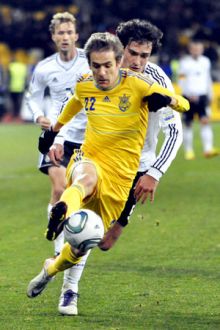The five days from last Friday to last Tuesday amply showed the result of the months-long work to host Euro-2012. It was at the same time the result of the builders, who commissioned two European-level stadiums, and that of the soccer players, who presented themselves to national audiences before taking part in the European finals.
It is symbolic that the national soccer team of Ukraine played matches at the reconstructed stadiums in Kyiv and Lviv against the teams of the countries whose stadiums had hosted the latest world (Germany, 2006) and European (Austria, 2008) championship finals held in Europe. The Ukrainians had by far the first opportunity to meet their European counterparts at the same le-vel at which Europe hosts the Ukrainians. I don’t think the Germans or the Austrians would have come to us otherwise. In the 20 years of an independent Ukraine, the teams of Germany and Austria have never played against the Ukrainians at their own will – only by the will of the draw that brought the Ukrainians and the Germans together in qualification tournaments.
Now everything has changed for the better. Owing to the prestige that Ukraine won by being able to host, together with Poland, the Euro-2012 soccer tournament, the world’s strongest teams have begun to play sparring matches against our national team. This kind of matches are not only a matter of prestige – they are also of great sport importance. For we can only assess the level of our national team, which, as a host to the European finals, has only been playing friendly matches in the past two years, when it plays against a strong rival.
We felt overexcited, awaiting the game against Germany in Kyiv. It was to be the first soccer match at the upgraded Olympic Stadium against one of the world’s all-time strongest national teams. Not to revert to this point any more, I will note that everything was done perfectly to hold topnotch matches in Kyiv and then in Lviv. All the rest, including transport and public services, needs to be improved, for which there is enough time and, apparently, desire on the part of the new sport arenas’ managers.
The next game against Austria in Lviv only proved this. Rather a mediocre team, which is similar to the German one by perhaps only the language of communication, unexpectedly created heaps of problems for the Ukrainian side. In any case, the Austrians created far more chances to score against Ukraine than the Germans had done. And if the Austrian squad had had players of the same level as Germany did, they would not have confined themselves to one goal scored in Lviv. Ukraine scored twice and won, achieving quite a good statistical result in a series of two friendly matches.
It will take a long time to minutely analyze the way the Ukrainian team played. But is it worthwhile to do so now that the team is only being formed, when it is too early to speak of well-established play links due to absence, for various reasons, of a number of the prospective players? At the same time, the fact that, deprived of some key players and having no special training, the national team of Ukraine produced quite an acceptable result, means that our soccer has not so bad a potential on the eve of Euro-2012. There are problems to solve and, what is more, there are audiences to play to. The immense interest in the national team’s matches, shown by stadiums packed to capacity and a high rating of television co-verage, only obliges our soccer players and coaches to go on playing well.







